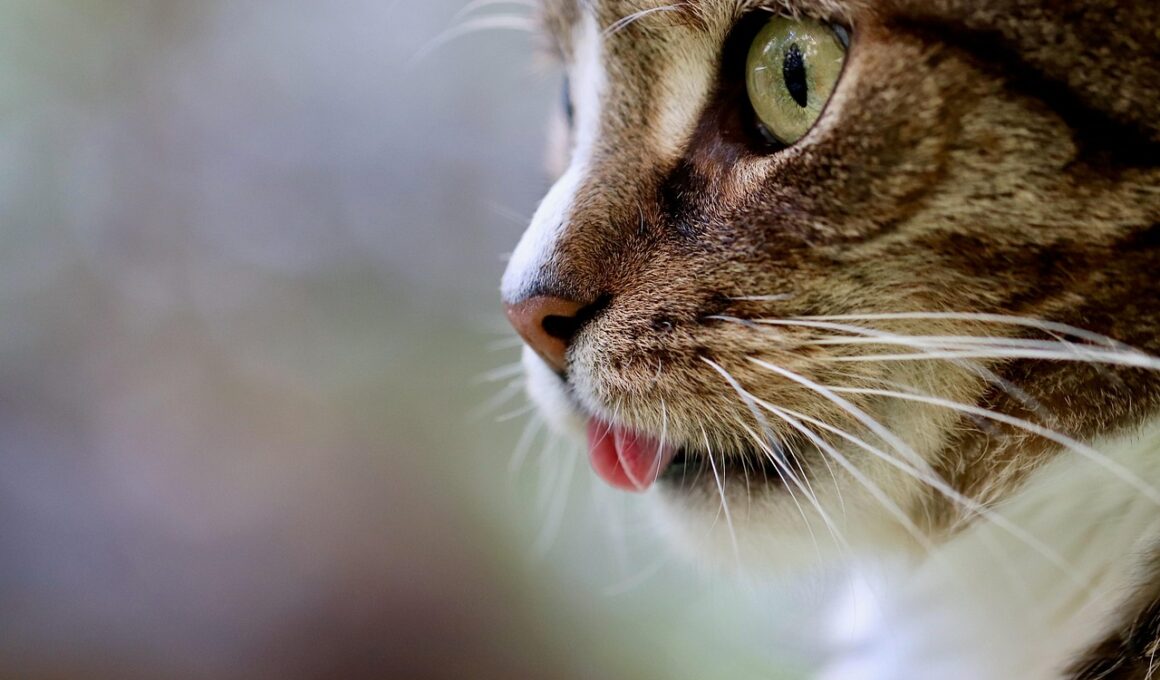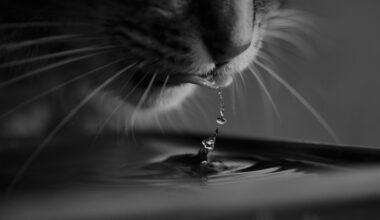Disease Risks: Outdoor vs. Indoor Cats and the Role of Vaccinations
Cat vaccinations play a crucial role in protecting our feline companions from various diseases. The decision of whether to keep cats indoors or allow them outside significantly influences their exposure to these potential health threats. Outdoor cats are at a heightened risk for diseases such as feline leukemia virus (FeLV) and feline immunodeficiency virus (FIV). These viruses can have devastating effects on an outdoor cat’s health, leading to severe illnesses and premature death. Vaccination can provide a protective barrier, but it also comes with considerations regarding lifestyle. Indoor cats, while generally safer from many dangers like traffic and predators, can still be at risk of illnesses if they come into contact with infected animals or even contaminated surfaces. Vaccines help to ensure that whether a cat lives indoors or outdoors, they remain healthy and protected. Indoor cats may require a specific set of vaccinations, differing from what outdoor cats need. Understanding these differences can be essential for ensuring the long-term health of your feline friend. Regular consultation with a veterinarian will guide vaccination decisions for both indoor and outdoor cats.
The Importance of Vaccinations
Vaccinations serve as a cornerstone of preventive healthcare for cats, particularly in safeguarding against communicable diseases. The importance of maintaining a vaccination schedule cannot be overstated, as it helps ensure prolonged immunity against prevalent cat diseases. Various pathogens can easily infiltrate a cat’s environment, exposing both indoor and outdoor felines. Vaccines train their immune systems to recognize and combat these threats effectively. For instance, core vaccines protect against diseases such as panleukopenia and calicivirus, which can cause severe illnesses. Additionally, outdoor cats often receive vaccinations targeting conditions unique to their lifestyle, including rabies and FeLV. Regular vaccination can mean the difference between life and death for outdoor cats that expose themselves to numerous risks, such as fighting with other cats. For indoor cats, the risk might be lower, but their health should not be neglected. Schedule annual vet visits to keep vaccination records updated for all cats, and discuss tailored vaccination plans based on specific lifestyles. This practice is vital for nurturing a healthy and thriving feline family member.
Health Risks for Outdoor Cats
Outdoor cats face numerous health risks that indoor cats may never encounter, hence requiring specific vaccinations. They are more prone to injuries from traffic, animal fights, and exposure to harsh weather conditions. In addition to physical dangers, outdoor cats are vulnerable to diseases transmitted through bites or scrapes during altercations with other animals. Common illnesses affecting outdoor felines include cat scratch fever and various upper respiratory infections, which may not be as prevalent inside the home. Vaccinations can greatly mitigate these risks, enabling outdoor cats to enjoy their freedom without compromising their health. With exposure to a range of potential pathogens, vaccines become essential in breeding resilience against infections. It is crucial for cat owners to monitor their pets’ health, particularly those that spend time outdoors. Immediate veterinary consultation is recommended if signs of distress arise. An established vaccination schedule contributes to the overall wellbeing of outdoor cats and promotes a happier life free from debilitating diseases. Empowering them with these preventive measures allows them to explore their instincts while still remaining protected.
Indoor cats also face specific health concerns, although they generally deal with fewer risks than outdoor cats. Yet, being indoors does not grant complete immunity from various illnesses. For instance, indoor cats might still be exposed to certain pathogens through visiting guests or other pets. It’s crucial to maintain a vaccination routine even for those believed to lead safe indoor lives. Regular immunization against core diseases is essential, as these can spread easily and result in severe health issues. Basic vaccinations like rabies and feline distemper lead to healthier pets overall. Also, maintaining a hygienic living environment will minimize exposure to diseases. Indoor cats can experience stress-related conditions, leading to health decline, emphasizing the importance of preventive care, including vaccinations. Healthy lifestyles contribute to a cat’s emotional and physical well-being. Vaccinations keep immunity levels high and protect indoor cats from diseases brought in from the outside world. Owners must be diligent in keeping track of their cats’ medical needs, ensuring vaccinations are up to date and comprehensive for every unique lifestyle.
Behavioral Aspects of Indoor vs. Outdoor Cats
The behavioral differences between indoor and outdoor cats often stem from their environment and lifestyle choices. Outdoor cats tend to exhibit more exploratory and adventurous behaviors, stemming from their freedom to roam and interact with nature. Their encounters with other cats and wildlife can lead to more socialization, but it also increases the risk of territorial disputes and bites. Regular vaccination becomes necessary to keep them safe from diseases that may arise in these interactions. Conversely, indoor cats tend to be more sedentary and less social, which may affect their mental health. Enrichment activities such as interactive toys and scratching posts are crucial to keeping indoor cats stimulated. Although they generally have fewer health risks, their emotional needs should not be overlooked. Owners must ensure that indoor cats have enough mental and physical challenges to avoid obesity and related health issues. Providing a safe environment with engaging activities can significantly enhance indoor cats’ quality of life. This ongoing balance between health and activity is integral to ensuring both indoor and outdoor cats lead fulfilling lives.
Consulting Your Veterinarian
Regular consultations with a veterinarian remain essential to keeping cats healthy, regardless of their living environment. Vets provide valuable insights into the specific vaccinations that cats require based on their lifestyles. Creating a tailored vaccination schedule can improve a cat’s chances of avoiding serious health issues. This is particularly important for outdoor cats, who face numerous threats daily. During veterinary visits, discuss potential risks specific to your area, such as prevalent diseases or parasites. Vets also assess the need for boosters and review the cat’s overall health condition. For indoor cats, it’s essential to keep vaccination schedules updated to prevent diseases that could arise from accidental exposure. Consultations can address any concern regarding behavioral changes, nutritional needs, or stress management strategies. Ultimately, maintaining a strong relationship with your veterinarian is crucial for ensuring cats receive appropriate preventive measures. Implementation of a thorough and routine veterinary care plan leads to a comprehensive approach to feline health, encompassing both vaccinations and overall well-being, contributing to longer, healthier lives. Owners should not hesitate to seek veterinary advice to keep their furry companions thriving and happy.
Community awareness plays an underlying role in the successful vaccination of both indoor and outdoor cats. Local campaigns or initiatives aimed at reducing the prevalence of contagious diseases can enhance the health quality of the feline population. Engaging the community in vaccination drives fosters greater awareness among cat owners about the importance of proper feline healthcare. Improved vaccination rates lead to herd immunity, significantly reducing disease spread. Initiatives can also target awareness of spaying and neutering cats, further preventing illnesses and overpopulation problems. Responsible cat ownership is key to managing public health, ensuring both outdoor and indoor cats are vaccinated and cared for properly. Owners are urged to educate themselves and others on the benefits of regular vaccinations, alongside the importance of social responsibility. Local shelters or spay/neuter programs may offer financial assistance for vaccinations. By working collaboratively, communities can help keep their felines safer and healthier, ultimately benefiting the entire feline community. The health of outdoor cats, as well as indoor cats, relies on proactive measures from their owners and the surrounding community to provide support and resources for effective vaccination programs.
Conclusion: Vaccinations remain a pivotal aspect of ensuring the health and security of cats, whether they are outdoors or indoors. Cat owners should understand the inherent risks associated with each lifestyle and the specific vaccines necessary to counteract these threats. While outdoor cats face distinct challenges with exposure to diseases, indoor cats also require proper vaccinations to maintain their health. Regular consultations with veterinarians ensure tailored health plans are enacted, leading to long, happy lives for our feline friends. Community engagement also plays a vital role in promoting responsible pet ownership and widespread awareness of vaccinations. By fostering a proactive approach to cat healthcare, alongside vaccination protocols, we can contribute to improved feline well-being, ensuring all cats, regardless of their lifestyle, thrive in a safe and healthy environment.


